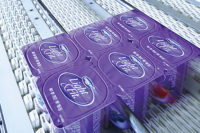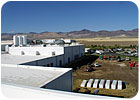
Construction began in October on a project that will add 150,000 sq ft, double plant capacity and result in 100 additional jobs.
WEST JORDAN, Utah-Backhoes and crane rigs have been as common a sight at Dannon’s western facility lately as inbound milk tankers and outbound tractor-trailers.
The 10-year-old West Jordan plant is in the midst of its largest expansion ever. The project, which is slated for completion of its first stage of expansion in 2008, will add five new lines to the five currently in place, and will nearly double throughput as Dannon works to grow the yogurt market in the United States.
“We’ll have a much bigger footprint, and we will expand the type of product we produce,” says Plant Mgr. Nikolaus Despain, as he looks over the construction activity while givingDairy Foodsa tour of the plant. “This facility offers a great deal of flexibility in the kind of products we can make and that will continue.”
Flexibility and advanced automation were among the traits that led to West Jordan being selected as Plant of the Year byFood Engineeringmagazine in 2000. That was just months after the plant was converted from its original use as a bottled water plant.
Dairy Foodsfeatured the Utah plant in 2002, but since then two new lines have been added.
As a modern plant, West Jordan was designed to accordion out, and the current project is the first footprint expansion. The plant will produce a broader array of products including Fruit on the Bottom, and it will add some packaging configurations.
“We are in the middle of installing the machinery needed to produce fridge packs for Danimals,” Despain says.
The plant will also soon begin producing some products for its sister company Stonyfield Farm, and has obtained the necessary organic certification.
Plant culture
“The philosophy we’ve adopted at the West Jordan facility is one of a team-based approach,” Despain says. “We work to empower our operators in every aspect of our operation. We want to educate and train them in the fundamentals so that they can make good decisions on the floor without having to go to management.”That collaboration carries over to functional teams, like the safety team and maintenance team, Despain adds.
“We have a diverse cross-section of our employees involved in all those.”
It also carries over to even the social and community aspect of the plant’s culture. The plant is very involved in the West Jordan community, which is just a few minutes south and west of Salt Lake City.
“We are a small plant in the greater Salt Lake area, but as far as the city of West Jordan, we are a major employer,” Despain says. “We are continually complimented on our involvement, and we want to continue to be a good partner with the community.”
The plant was the anchor tenant in a new industrial park, and uses West Jordan city utilities.
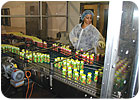
Two Serac fillers are used for drinkable products like the Danimals XL line pictured here.
Batching the white mass
The five lines currently in place include a cup filler used to produce cups of Light & Fit brand yogurt in 6 oz cups, three bottle fillers that run at dizzying speeds of up to 30,000 bottles per hour to fill bottles of Light & Fit yogurt drinks and Danimals yogurt drinks, and finally, a form-fill-seal used for multipacked cups of Light & Fit Crave Control and Carb Control cup yogurt.Milk is sourced through DFA, and arrives in a double drive-through bay that will handle two regular trucks or two super tankers at once.
“We generally have one unloading and one cleaning,” Despain says.
This set up will be history, soon, however, and the space given over to a new production area. The expansion project will include a new 2 by 2 drive-through bay.
Once milk is received, it is tested for antibiotic residue, fat and protein content, and somatic cell counts and then it is cooled and sent to one of two raw milk tanks for storage of up to eight hours. Milk and cream are separated and homogenized. And then an APV AGC Pasteurizer is used for an HTST regimen. Pasteurized milk is sent to storage tanks and called up for batch mixing as needed. Once a base batch has been mixed it is pasteurized again before inoculation and fermentation.
Despain says that company-wide, Dannon takes special care in the handling and inoculation of its cultures. This involves careful cold storage, bathing of the culture containers in a parasitic acid solution prior to opening, and finally, a unique introduction method.
The pasteurized milk is introduced into the six large DCI sterile mix tanks at the appropriate temperature, and once the tanks are a third full, the milk flow is diverted into a canister containing the cultures, at which point the cultures are introduced without the possibility of contamination.
“In many yogurt production facilities, cultures are added by hand into a fermentation tank, and that can obviously lead to contamination concerns,” Despain says.
Dannon’s injection method also provides a more even distribution of cultures which has some advantages in the fermentation. Once the milk is inoculated, it then travels to one of six silos where fermentation takes place to create a white mass.
Along with the addition of new fillers, the expansion project will result in twice as much process capacity and three more batch tanks being added.
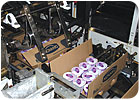
Two different cup fillers are used for individual cups which are then packed in corrugated cases.
Flexible filling
When it is ready, the white mass is sent to the fillers, where fruit and flavors join the product in the filler bowls. Those fillers include two cup fillers.“One uses preformed cups and in the other, the cups are formed from roll stock,” Despain says.
Cups travel through the machine in rows of 12 and are index filled and then sealed with foil lids. Each machine fills 15,000 cups per hour. Cups that will be sold individually are put into cases of 12 using corrugated cases formed on a caser from Douglas Machine. Code dating is applied and the cases are sent to an automated palletizer.
An Arcil form-fill-sealer uses a roll stock material to form cups of 4 oz size and fills them at a tremendous speed of about 30,000 cups per hour. An overwrap is applied with an Aries machine from MeadWestvaco.
The Serac fillers are used to fill the Danimals drinkables and the Light & Fit Smoothies. But first the bottles are formed at a wall-to-wall on-site facility operation by Graham Packaging. The Graham facility has three bottle forming units and can produce to meet Dannon’s need with just-in-time delivery. Shrink sleeves are applied before the bottles are conveyed to Dannon’s filling room.
Despain says that outsourcing the blowmolding function makes perfect sense for a facility like Dannon’s which manufactures a line of complex, value added products.
“Our primary area of expertise is making yogurt and other cultured fresh dairy products,” he says. “Our packaging is very important, however, this does not need to be a core competency in manufacturing if we can leave this to a third-party expert.”
The Serac machines, like the Stork, use a hepafiltration system to keep the filling environment ultra-clean. With the Serac fillers the bottles are inverted and sprayed with acidified water and then dried with a burst of sterile air just prior to filling. They weave their way through the cogs of the rinser and the filling head quickly enough to cause a visual blur, and the machines can run more than 20,000 bottles per hour.
They are sealed with the unit and built-in sensors monitor seal function. An overcap is applied just before the product exits the filler.
Quality control sampling and testing is done with samples right on the floor before the individual bottles are bundled.
The bottles are also bundled into multipacks in dimensions of four and eight using an Aries machine.
Dannon has also worked with Mead Westvaco to develop a customized application for a 24-bottle refrigerator package similar to the Coca-Cola Fridge Pack. It will be used for the 3.1 oz Danimals drinkable products.
“This is certainly a direction in which the market is going,” Despain says. “It took a while to work it out, but we have come up with something that will work very well. We needed to develop a vertical configuration that will keep some of the stress off of the closures.”
After palletizing, all product is sent to cooling cells that circulate cold air around each pallet and quickly drop the temperature to slow the fermentation. At West Jordan, cold storage of pallets is kept to a minimum, with most of the product being stored no more than a day.
Outgoing loads are dispatched through a four-bay load out area that will continue to serve the plant during expansion, but the layout and procedures are being reconfigured to deal with the added flow.
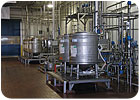
Fruit preserves arrive at the Dannon plant in aseptic containers and are added at the filler.
Quality, safety and community
Despain says the plant has an outstanding employee safety record and puts a great deal of effort into product safety and traceability.“We’re one the safest facilities in the entire company. We have had just one lost-time accident in 4.5 to 5 years and it was an accident that occurred in the parking lot, so it’s been nearly five years since a lost-time accident in the plant.”
“As far as compliance standards, we are an AIB audited facility and we recently were rated Superior in Food Safety. We have had six years of either excellent or superior food safety ratings. We have obtained an ISO 14000 environmental certification and are working on obtaining our ISO 9000 certification of our Quality Systems. We also have HACCP and NCIMS certification.”
The plant also conducts mock recalls and verifications frequently.
“We need to be able to trace product back to our raw materials, and we can go upstream and downstream if heaven forbid we had a problem.”
In October, the West Jordan plant contributed its portion of a corporate Dannon Next Generation Nutrition Grant to Salt Lake County 4-H Youth Development Program.
The $26,200 grant will help support the 4-H TRY (Teens Reaching Youth) Nutrition Education Program. Forty local teens, trained in healthy nutrition practices by Utah State University staff, will teach approximately 200 children (grades K–5) about good nutrition and healthy lifestyle habits.
Coast to coast
The West Jordan facility is, of course, part of a team of three plants, and three regional distribution facilities.The production facility in Minster is one of the largest yogurt manufacturing plants in the world-Dannon says it’s the largest. Producing 230,000 cups of yogurt an hour or 3 million cups per day, it accounts for 65% of all yogurt sold in the United States. Dannon manufactures the majority of its eastern-bound products from the Minster facility, and it is also undergoing some expansion. The plant currently occupies 346,000 sq ft on 30 acres and has 400 employees.
Dannon’s smallest production facility is in Ft. Worth, Texas, and plays an important role in helping the company service the growing market in the southern states.
The expansion in West Jordan will add another 150,000 sq ft to the plant’s 200,000 sq ft footprint. The company received more than $8 million in grant money from Utah economic development agencies. The total project cost will be in the tens of millions.
There are currently 200 employees and about 100 more will be added as a result of the expansion.
Once the first-phase expansion is completed at West Jordan, the two larger plants will each produce a broader variety of products. The Utah plant will also begin to produce some products for Stonyfield Farm.
Select Dannon Vendors
- AGC Proflow
- APV valves
- Alcan
- Alcoa
- Arcil
- Aries-MeadWestvaco
- Big D
- Boccard
- Chr. Hansen
- CLH
- DCI
- Delaval
- Douglas Machine
- Ecolab
- Foss Milkoscan
- GEA
- Graham Packaging
- H.S. Crocker
- Huhtamaki (cups)
- Krones labeler
- NTS conveyor
- Serac
- Silgan closures
- Stork
- Tetra Pak Process Eq.
- Westfalia Separator.
